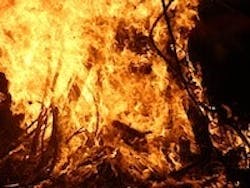Report Explains How Wildfires Impact Drinking Water
In recent decades, wildfires of unprecedented magnitude and severity have increased in frequency, raising concerns about impacts on local natural resources such as water. Water Research Foundation (WRF) and Canadian Water Network (CWN) recently released a new report that offers a comprehensive look at the state of knowledge around this subject and the potential for mitigating the impact these wildfires can have on water supplies.
Natural disturbances to forests by wildfire can adversely affect water supply, water quality, and stream health for years, or even decades, after it occurs. These effects can also be felt much farther downstream at larger basin scales, increasing the likelihood that drinking water treatment processes will be impacted.
Wildfire Impacts on Water Supplies and the Potential for Mitigation focuses on knowledge mobilization and lays the groundwork to systematically fill research gaps related to water quality, the vulnerability of municipal water utilities to wildfires, and the efficacies of mitigation measures to protect source water. The findings in this report will help ensure scientists, engineers, foresters and water managers have the resources they need to develop appropriate safety plans.
The findings outlined in this report were gathered during a two-day experts’ workshop in Kananaskis, Alberta featuring 30 scientists and practitioners from the U.S., Canada and around the world. Experts discussed what leading-edge science exists to explain trends in wildfire occurrence and risks, the impacts of wildfires on water supply and treatment, and the evidence supporting the effectiveness of forest and water management techniques to mitigate the impacts of wildfires on drinking water supplies and treatment.
“Wildfires can have catastrophic impacts on drinking water sources, ecosystem health and the ability for water providers' to deliver clean, safe drinking water to communities,” said Bernadette Conant, executive director of CWN. “Our organization, like the Water Research Foundation, is keen on arming decision-makers with what they need to provide safe drinking water and we believe projects like this one will be a valuable resource in serving this mission.”
“Forested regions often account for a substantial proportion of a local population’s water supply,” said Rob Renner, executive director of WRF. “Our goal in working with Canadian Water Network on this project was to address what water supply and treatment, public health and other emergency preparedness professionals need to most effectively plan for and address wildfire related water supply and treatment issues.”
Experts participating in the two-day workshop discussed issues surrounding wildfires and related supply, treatment, and impact mitigation efforts based on their own experiences in other forested locations. As such, the outcomes of this workshop included in the final report produced by WRF and CWN are equally relevant to many areas in North American and beyond.
This report represents the latest effort by both WRF and CWN to address wildfires and corresponding source water matters. Recently, WRF published a report on examining best practices for wildfire risk reduction and mitigation. CWN produced its own study examining the management of risks posed to municipal waterworks systems as a result of wildfires in Alberta, Canada in 2012.
Source: Water Research Foundation
